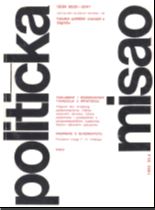Kant, Hegel, Heller i ambivalentni "ustav slobode"
Kant, Hegel , Heller and the Ambivalent "Constitution of Fredom"
Author(s): Werner BeckerContributor(s): Tomislav Martinović (Translator)
Subject(s): Constitutional Law, Political Philosophy
Published by: Fakultet političkih znanosti u Zagrebu
Keywords: constitution; freedom; Kant; Hegel; Heller;
Summary/Abstract: The author shows that it is not possible to formulate a consistent theory of freedom, tying together the internal perspective of action, and the external perspective of rational description and explanation of action. In the history of philosophical discussion about freedom as a fundamental concept of liberalism Kant and Hegel represent two extremes. Each tried to formulate consistently a concept of freedom and its moral and political consequences, but both paid the price of one-sidedness. Kant postulates the primacy of the internal perspective of the moral subject, which is ideally expressed by his categorical imperative. However, the concept of freedom defined from the stance of autonomous morals loses contact with historical world of traditional values, with the consequence of moralizing politics and unrealistically disregarding the nation as a characteristic framework of politics. Hegel points out the priority of the external perspective, which gives him an analytical advantage relative to liberal theories of natural law and Kant’s moralist position. However, as warned by the German political theorist Hermann Heller, Hegel’s position results in defining the sphere of collective morality as superior to individual action, disregarding the protection of individual liberties against the state and accepting national politics of power as the only criterion for international politics. The author concludes that liberal constitutions, unlike totalitarian, must then be inconsistent.
Journal: Politička Misao
- Issue Year: XXX/1993
- Issue No: 04
- Page Range: 130-139
- Page Count: 10
- Language: Croatian

